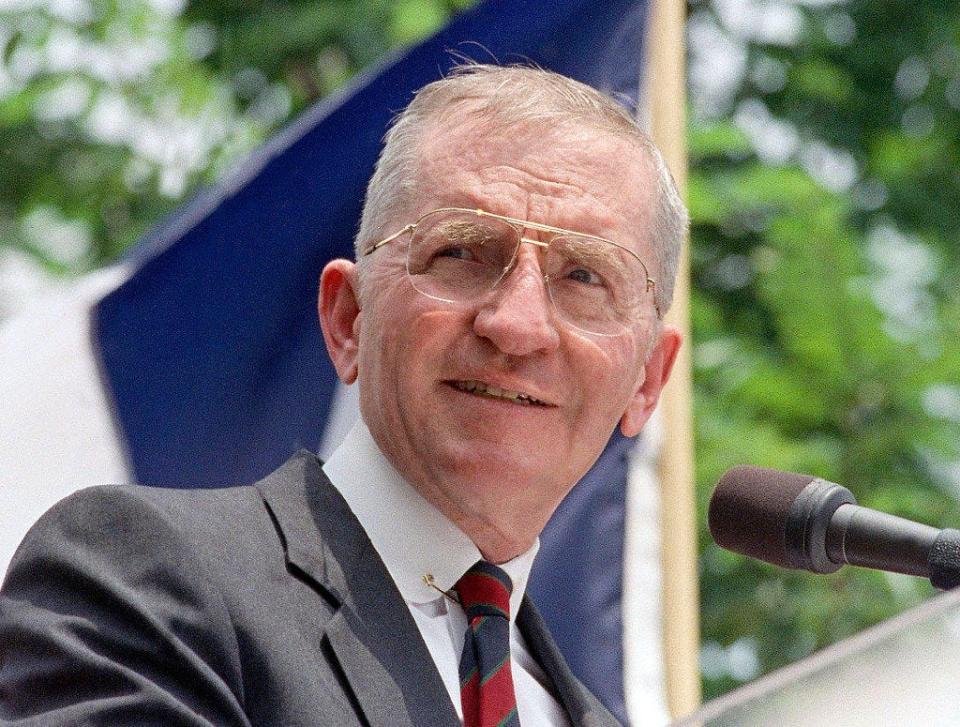Trump vs. Biden again? Is it finally time for a third-party candidate to succeed?
- Oops!Something went wrong.Please try again later.
- Oops!Something went wrong.Please try again later.
- Oops!Something went wrong.Please try again later.
- Oops!Something went wrong.Please try again later.
The American federal-state governance structure hasn’t been conducive to third parties obtaining presidential power. Until today. A unique combination of political and economic realities is creating an opportunity for a centrist coalition to win in 2024. But can a third-option movement continue to grow, given the failure of past efforts, and what are the headwinds a centrist effort will encounter?
An effort headed by H. Ross Perot in 1992 and 1996 came close. But billionaire Perot failed to get any electoral votes even though he received nearly 19% of the popular vote in 1992 and 8% in 1996. Perot substantially affected the political landscape and changed the course of history. That, not gaining personal political power, was his goal. He was remarkably successful.

Most people view third-party efforts as spoilers. For example, Republicans believe Perot got Bill Clinton elected by taking votes primarily from the Republican base, defeating President George H.W. Bush’s bid for a second term. But exit polls conducted in 1992 showed Perot drew equally from potential Bush and Clinton voters and 24% of Perot’s voters would not have voted had Perot not been on the ballot.
Inside our poll: The unlikely voters of 2024 want a 3rd party – or maybe 4 or 5
Today’s unique factors
As a Joe Biden vs. Donald Trump contest appears to be unfolding, the Republican and Democratic parties are doubling down and running primarily against each other while neither is presenting positive visions for America. They are controlled by the party faithful that comprise only 30% of the total electorate (about 15% supporting each party). But neither party enjoys electable popularity.
President Biden’s approval rating is at a historical five-year low for a sitting president, and former President Trump’s at a disadvantage because he lost once to Biden and his popularity continues to be challenged as his unconstitutional conduct surrounding the Jan. 6 insurrection unfolds. In addition, there’s the publicity about his former affairs, which should alienate women, who account for over 50% of the electorate in this post-#MeToo world.
Both parties are controlled by narrow, self-interested factions seeking to use government to feather their nests for selfish purposes. Neither appears capable of communicating a coherent vision of what a Trump- or Biden-governed America would look like. Thank God polls show that Americans understand this reality and appear poised to act to reject the tyranny of these extreme factions.
Trump deserves his day in court: The Trump election fraud trial is one America needs even if we don’t want it
The important issues being neglected
There are an increasing number of important issues facing the country where Americans of both parties are supporting dysfunctional parochial positions and therefore failing to address the national interest. One is immigration and the other is the continued slowing of the economy, and reduced job creation combined with the explosive growth in the debt to gross domestic product ratio. More to come on these.
GOP, Democrats should listen to voters: Maybe if we stop yelling at each other we could move our country forward
The evidence
Here’s a summary of a December opinion poll done by a Washington think tank, No Labels, which may support a third presidential option in 2024 and which has been effective organizing a Congressional Problem Solvers Caucus. The poll was based on 26,000 interviews in all 50 states and supports the feasibility of a centrist-led coalition based on the following facts: Only 30% of Americans are committed to the Republican and Democratic parties as their base. A historical high of over 40% are independents and don’t support either major party. Another 30% continue to be loosely supportive of the Republican and Democratic parties but would support an attractive centrist candidate.
It’s going to be very interesting in the next few months leading up to November 2024.
John Knubel is co-author of several books, including "America in 2040: Still a Superpower? A Pathway to Success." He is a Naval Academy graduate, held various positions in the federal government and served as a bank executive. He resides in Franklin.
This article originally appeared on Nashville Tennessean: 'Spoiler' alert: Could 2024 be chance for third-party candidate win?

